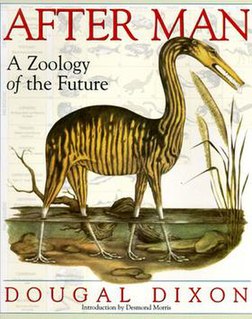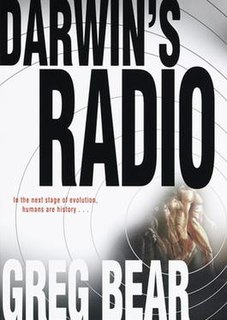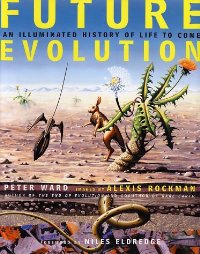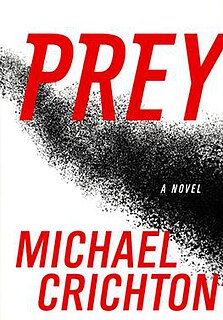 W
W2001: A Space Odyssey is a 1968 science fiction novel by British writer Arthur C. Clarke. It was developed concurrently with Stanley Kubrick's film version and published after the release of the film. Clarke and Kubrick worked on the book together, but eventually only Clarke ended up as the official author. The story is based in part on various short stories by Clarke, including "The Sentinel". By 1992, the novel had sold three million copies worldwide. An elaboration of Clarke and Kubrick's collaborative work on this project was made in the 1972 book The Lost Worlds of 2001.
 W
WAfter Man: A Zoology of the Future is a 1981 speculative evolution book written by Scottish geologist Dougal Dixon and illustrated by several illustrators including Diz Wallis, John Butler, Brian McIntyre, Philip Hood, Roy Woodard and Gary Marsh. The book also features a foreword by Desmond Morris. After Man explores a hypothetical future set 50 million years from now, a time period Dixon dubs the "Posthomic", which is inhabited by animals that have evolved from survivors of a mass extinction succeeding our own time.
 W
WAlienators: Evolution Continues is an American animated comic science fiction television series based on the 2001 film Evolution. The show is a continuation of the 2001 Ivan Reitman science fiction film, Evolution.
 W
WBlindsight is a hard science fiction novel by Canadian writer Peter Watts, published by Tor Books in 2006. It won the Seiun Award for best translated novel, and was nominated for the Hugo Award for Best Novel, the John W. Campbell Memorial Award for Best Science Fiction Novel, and the Locus Award for Best Science Fiction Novel. The novel follows a crew of astronauts sent out as the third wave, following two series of probes, to investigate a trans-Neptunian Kuiper belt comet dubbed 'Burns-Caulfield' that has been found to be transmitting an unidentified radio signal to an as-yet unknown destination elsewhere in the solar system, followed by their subsequent first contact. The novel explores questions of identity, consciousness, free will, artificial intelligence, neurology, game theory as well as evolution and biology.
 W
WCat is a fictional character in the British science fiction sitcom Red Dwarf. He is played by Danny John-Jules. He is a descendant of Dave Lister's pregnant pet house cat Frankenstein, whose descendants evolved into a humanoid form over three million years while Lister was in stasis. As a character he is vain and aloof, and loves to dress in extravagant clothing. He is simply referred to as "Cat" in lieu of a real name.
 W
WThe Croods is a 2013 American computer-animated adventure comedy film produced by DreamWorks Animation and distributed by 20th Century Fox. The film was written and directed by Kirk DeMicco and Chris Sanders, and stars the voices of Nicolas Cage, Emma Stone, Ryan Reynolds, Catherine Keener, Clark Duke, and Cloris Leachman. The film is set in a fictional prehistoric Pliocene era known as "The Croodaceous" when a prehistoric caveman's position as a "Leader of the Hunt" is threatened by the arrival of a genius who comes up with revolutionary new inventions as they trek through a dangerous but exotic land in search of a new home.
 W
WDarwin's Radio is a 1999 science fiction novel by Greg Bear. It won the Nebula Award in 2000 for Best Novel and the 2000 Endeavour Award. It was also nominated for the Hugo Award, Locus and Campbell Awards the same year.
 W
W"Endless Forms Most Beautiful" is a song by Finnish symphonic metal band Nightwish. It is the second single from their eighth album "Endless Forms Most Beautiful". The song was announced on April 17, 2015, alongside its release date and cover, and was eventually released on May 8, 2015 together with a lyric video.
 W
WEvolution is a collection of short stories that work together to form an episodic science fiction novel by author Stephen Baxter. It follows 565 million years of human evolution, from shrewlike mammals 65 million years in the past to the ultimate fate of humanity 500 million years in the future.
 W
WFuture Evolution is a book written by paleontologist Peter Ward and illustrated by Alexis Rockman. He addresses his own opinion of future evolution and compares it with Dougal Dixon's After Man: A Zoology of the Future and H. G. Wells's The Time Machine.
 W
WGalápagos is the eleventh novel written by American author Kurt Vonnegut. The novel questions the merit of the human brain from an evolutionary perspective. The title is both a reference to the islands on which part of the story plays out, and a tribute to Charles Darwin on whose theory Vonnegut relies to reach his own conclusions. It was first published in 1985 by Delacorte Press.
 W
WGreenworld is a 2010 speculative evolution and science fiction book written by Scottish geologist Dougal Dixon and primarily illustrated by Dixon himself, alongside a few images by other artists. Greenworld has, unlike Dixon's previous works on speculative evolution, only been published in Japan, where it was released in two volumes. The book features a fictional alien planet and a diverse biosphere of alien organisms.
 W
W"Homerazzi" is the sixteenth episode of the eighteenth season of The Simpsons. It originally aired on the Fox network in the United States on March 25, 2007. It was written by J. Stewart Burns, directed by Matthew Nastuk, and guest starred J.K. Simmons as the tabloid editor, Betty White as herself, and Jon Lovitz as Enrico Irritazio.
 W
WThe Invincible is a hard science fiction novel by Polish writer Stanisław Lem, published in 1964.
 W
WIs Genesis History? is a 2017 American Christian film that uses the pseudoscience of creation science to promote Young Earth creationist beliefs that contradict established scientific facts regarding the origin of the Universe, the age of the Earth, and the common descent of all lifeforms.
 W
WThe Long Earth is the first novel in a collaborative science fiction series by British authors Terry Pratchett and Stephen Baxter.
 W
WMan After Man: An Anthropology of the Future is a 1990 speculative evolution and science fiction book written by Scottish geologist Dougal Dixon and illustrated by Philip Hood. The book also features a foreword by Brian Aldiss. Man After Man explores a hypothetical future path of human evolution set from 200 years in the future to 5 million years in the future, with several future human species evolving through genetic engineering and natural means through the course of the book.
A Matter of Faith is a 2014 American Christian drama film directed by Rich Christiano and starring Harry Anderson, Jordan Trovillion, Jay Pickett, and Clarence Gilyard. The film was released into theaters on October 17, 2014 by Five & Two Pictures. The film follows a Christian student and her father (Pickett) who are challenged by a biology professor (Anderson) who teaches evolution.
 W
WIn Arthur C. Clarke's Space Odyssey, Monoliths are machines built by an unseen extraterrestrial species. In the series of novels, three Monoliths are discovered in the Solar System by hominids and humans. The response of the characters to their discovery drives the plot of the series. It also influences the fictional history of the series, particularly by encouraging humankind to progress with technological development and space travel.
 W
WThe Invincible is a hard science fiction novel by Polish writer Stanisław Lem, published in 1964.
 W
WThe New Dinosaurs: An Alternative Evolution is a 1988 speculative evolution book written by Scottish geologist Dougal Dixon and illustrated by several illustrators including Amanda Barlow, Peter Barrett, John Butler, Jeane Colville, Anthony Duke, Andy Farmer, Lee Gibbons, Steve Holden, Philip Hood, Martin Knowelden, Sean Milne, Denys Ovenden and Joyce Tuhill. The book also features a foreword by Desmond Morris. The New Dinosaurs explores a hypothetical alternate Earth, complete with animals and ecosystems, where the Cretaceous-Paleogene extinction event never occurred, leaving non-avian dinosaurs and other Mesozoic animals an additional 65 million years to evolve and adapt over the course of the Cenozoic to the present day.
 W
WPlanet of the Apes is an American science fiction media franchise consisting of films, books, television series, comics, and other media about a world in which humans and intelligent apes clash for control. The franchise is based on French author Pierre Boulle's 1963 novel La Planète des singes, translated into English as Planet of the Apes or Monkey Planet. Its 1968 film adaptation, Planet of the Apes, was a critical and commercial hit, initiating a series of sequels, tie-ins, and derivative works. Arthur P. Jacobs produced the first five Apes films through APJAC Productions for distributor 20th Century Fox; since his death in 1973, Fox has controlled the franchise.
 W
WThe Max Planck Institute for Evolutionary Biology's Plön Evolution Path is an educational public works project that presents the history and evolution of life on Earth. It is one of a number of Evolution Paths in Germany.
 W
WPrey is a novel by Michael Crichton, his thirteenth under his own name and twenty-third overall, first published in November 2002, making his first novel of the twenty-first century. An excerpt was published in the January–February 2003 issue of Seed. Like Jurassic Park, the novel serves as a cautionary tale about developments in science and technology; in this case, nanotechnology, genetic engineering, and distributed artificial intelligence.
 W
WScherzo is a Big Finish Productions audio drama based on the long-running British science fiction television series Doctor Who. It is the beginning of the "Divergent Universe" saga which continued until The Next Life.
 W
WSon of Man is a science fiction novel by American writer Robert Silverberg, published in 1971. The book is about Clay, a 20th-century man, who travels billions of years into the future and meets humanity in its future forms. Some of the issues discussed in the book are sexuality, telepathic communication between people, physical prowess or frailty, division of humans by caste or ability, and the preservation of ancient wisdom, among other things.
 W
WThe Time Machine is a science fiction novella by H. G. Wells, published in 1895 and written as a frame narrative. The work is generally credited with the popularization of the concept of time travel by using a vehicle or device to travel purposely and selectively forward or backward through time. The term "time machine", coined by Wells, is now almost universally used to refer to such a vehicle or device.
 W
WThe Tomorrow People is an American science fiction television series developed by Greg Berlanti, Phil Klemmer, and Julie Plec which aired on The CW during the 2013–14 American television season. It was a remake of the original British television series of the same name, created by Roger Price, which ran from 1973–79. The series follows a group of young people who possess psionic powers as the result of human evolution.
 W
WThe X-Men are a team of fictional mutant superheroes appearing in American comic books published by Marvel Comics. Created by artist/co-writer Jack Kirby and writer Stan Lee, the characters first appeared in The X-Men #1 and formed one of the most recognizable and successful franchises of Marvel Comics, appearing in numerous books, television shows, films, and video games.